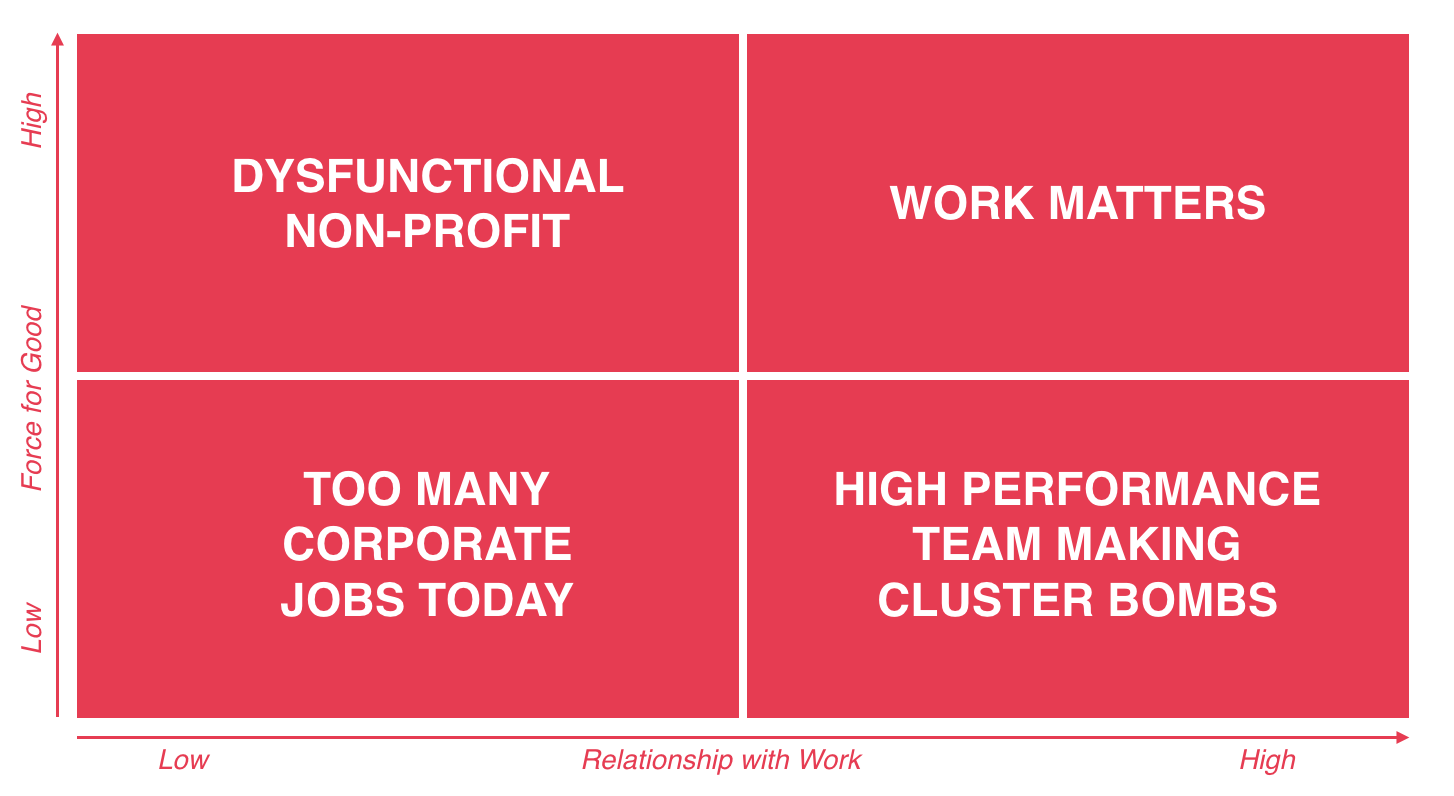We’ve said for the last six years that Atomic’s vision is to be a 100-year-old firm. Our vision has helped us make decisions and invest for the long-term. It guides my work as CEO. It plays well when telling our story publicly. It’s novel for a technology firm.
But it has problems. You could maybe stretch and say it describes how we’d like the world to be, in a self-focused and narrow fashion. But you definitely can’t say it answers the question of why we exist. It’s a desired outcome, or a long-term goal, not a purpose or broad vision.
While this 100-year vision has served us well, it begs the question, “Why?” Why should Atomic be around indefinitely? Because the founder likes the idea of a legacy? Not broadly compelling. Because we’re profitable? Not compelling at all. Our vision didn’t have a moral foundation. It also didn’t really describe how we’d like the world to be. Neither purpose nor vision, it needed work.

Our Purpose
Atomic’s purpose — why we exist — is to be a company where work matters.
Work matters to people when they believe their company is a force for good, and when their job allows them to:
- Contribute and be productive
- Form meaningful connections with people
- Feel recognized, respected, and appreciated
We act according to the assumption that all Atoms expect more than a transactional relationship with work. We think this just makes good sense, given that we all spend half of our adult waking hours at work. For that precious time, we should want more than a paycheck. Time, after all, is the only truly limited and valuable resource in all of our lives.
When work matters, it’s a powerful tool. We strive to harness that tool to the benefit of employees, clients, and our communities.
How are we a force for good?
Being a force for good is the moral foundation of our goal to be a 100-year-old company. That foundation is the answer to the question that our previous vision begged: why should Atomic be protected, grown, and perpetuated? As an artificial entity, Atomic has no soul but can be immortal. The aggregate good Atomic can do therefore has the potential to exceed the good any single individual can do. Atomic itself is worthy.
We are a force for good in the world by giving more than we take. That very high level strategy means things like:
- making sure clients feel they receive more than they pay for, helping their companies achieve their mission,
- growing Atoms both personally and professionally,
- bringing Atoms’ significant-others into learning and growth opportunities,
- hosting community lectures,
- inspiring and teaching K-12 students,
- favoring local vendors, not just the cheapest provider,
- donating our time, talents, and treasure to non-profits and community needs
We talk internally about the good we do as falling in four distinct categories: Product, Profit, People, and Place. These categories represent various stakeholders: clients, Atoms, Atoms’ families, peers, partners, and the people in our virtual and local communities. Our “4 Ps” is our way of expressing a triple bottom line, and our B Corp values.
Being a force for good allows us all to feel proud of being an Atom, and to know that our jobs make us a part of something bigger than ourselves.

What can you get from a job?
It takes a lot of things to lead a satisfying life, some of which work can’t hope to provide. But even though work isn’t sufficient to live a meaningful and satisfying life, I’d argue that it’s hard to achieve that life if the time we spend working doesn’t contribute to it.
At it’s simplest, this is a numbers game. If we spend roughly half of our adult waking hours in work, and we get nothing more for that time than a paycheck, we’re squandering an opportunity, and we’re making it that much harder to build a satisfying, fulfilling life. This notion is the core of my complaint about the phrase “work/life balance.”
What can work contribute to a satisfied life? Lots. I believe everyone needs to feel they contribute, that they do their share. No one likes feeling that what they do is a waste of time, or their efforts are pointless. They want to feel productive. We’re a social species, and for the vast majority of us, meaningful connections to others is an essential part of a good life. I don’t know anyone who doesn’t need to be recognized and respected for who they are, what they do, and how they contribute. We need appreciation and affirmation of our existence. Lastly, most of us do better when we’re a part of something greater than ourselves. We are tribal, for better and worse, and find meaning in our affiliations.
It’s a sad reality that many jobs don’t fill the needs above. Many companies aren’t structured to allow this to happen. Many people don’t even think this is a reasonable thing to expect from their work. Whether they carry baggage from previous work experience, or they have unconsciously accepted the notion that companies only exist to make money, they have low expectations about what work provides them beyond a paycheck. This is a shame.

Purpose beyond our commercial offering
In the past I’ve described our purpose as doing everything possible to help our clients achieve their mission. I talked about how we adopted our client’s mission.
Working hard on our clients’ behalves is a very powerful and effective purpose for our teams, but falls short of inspirational as our company purpose. As a generalist, marketing-led software product development consultancy, we work with companies in nearly every industry. If our company purpose was tied to our clients’ mission, then from the perspective of an individual maker, it would be as if the company purpose changed every time they switched projects.
At first blush, the fact that our new purpose statement says nothing about technology or our commercial offering seems odd. While we’re really good at designing and building custom software for our clients, and most of us care a lot about the craft of software, that isn’t the only reason our developers choose Atomic over other employers, or why they stay with us in a red-hot labor market. And it isn’t what attracts our non-maker employees.
To be a company where work matters has helped us attract and retain talented, caring people of all sorts. That’s a huge competitive advantage in our work as a consultancy. Without the right people, we could never succeed in our commercial offering.
Giving more than we take — our high-level strategy for being a force for good — ensures our commercial success by exceeding our clients’ expectations, generating repeat business, and creating positive brand equity in our local markets.
Two dimensions of our purpose
My colleague Mike Marsiglia suggested a great way to clarify that our purpose has two distinct dimensions—he applied the power tool of the MBA and made a 2×2 matrix!
The important point the matrix above brings home to me is that you need both things for work to matter—you should feel that your company is a force for good, and you should have a positive personal relationship with your work.
Line these both up, and you have a job that can be a powerful tool in helping you lead a fulfilled and satisfied life, and a company that deserves to be 100 years old someday.
- Attention: Spending Your Most Valuable Currency - February 10, 2022
- Slicing the Revenue Pie in a Multi-Stakeholder Company - July 30, 2021
- Commercial versus Existential Purpose - July 19, 2021
- How I Misunderstood Mentorship and Benefited Anyway - June 16, 2021
- Sabbath Sundays and Slow Mondays - June 4, 2021


Philip Streng
December 31, 2018Carl,
In receiving your out of office reply, and having a few minutes of extra time, I read your blog on purpose, which led me to your B company and work/life balance blogs-which I printed to read later. KUDOS to you for continuing what you enjoy-your blog being one of those things. In addition, I couldn’t help but smile regarding the purpose posting as I believe my branch partners and I feel a strong sense of purpose and gratefulness in serving clients like you and Mary. Happy New Year!
Carl Erickson
January 1, 2019Thanks, Philip. Glad you enjoyed the post.